
Recent Reviews by Rahul Desai
The Hollywood Reporter India
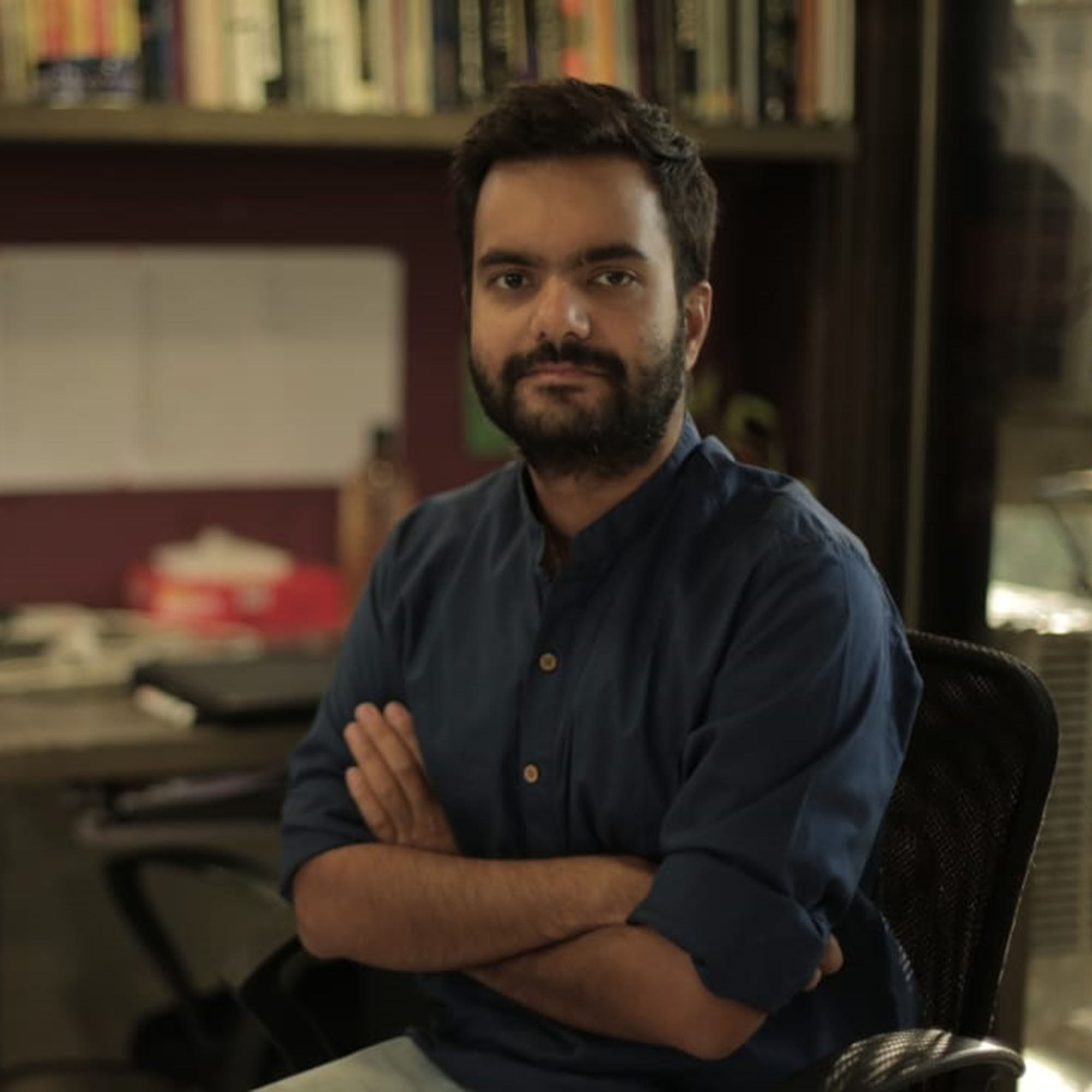
A film critic and columnist, Rahul Desai writes for The Hollywood Reporter India and OTTPlay. In his spare time, he runs a weekly movie podcast called IIF.
Films reviewed on this Page
Kanneda
Khakee: The Bengal Chapter
Be Happy
The Diplomat
Humans in the Loop
The Waking of a Nation
Nadaaniyan
Dupahiya
Crazxy
Superboys of Malegaon
Kanneda

All Ambition, Little Guile
The eight-episode series struggles to capture the Punjabi immigrant experience in 1990s Canada.
Kanneda, the title of this eight-episode drama, is “Canada” pronounced with a Punjabi twang. The theme is clear — an Indian immigrant story that unfolds in the awkward cultural gap between Kanneda and Canada. The setting is Vancouver in the 1990s; the narrator helpfully tells us that racism is rampant and Punjabis continue to be treated as second-class citizens. The central character is Nirmal ‘Nimma’ Chahal (Parmish Verma), a young and hotheaded chap who slowly mutates from fairytale to cautionary tale. It’s a familiar journey: Nimma starts off honest (a rugby scholarship to kickstart a music career), before losing faith in the system and getting into the drugs-and-gangster business. Flashbacks allegedly suggest that his family left Punjab during the 1984 Anti-Sikh riots, but his trauma looks anything but generational.
All 3 reviews of Kanneda here
Khakee: The Bengal Chapter
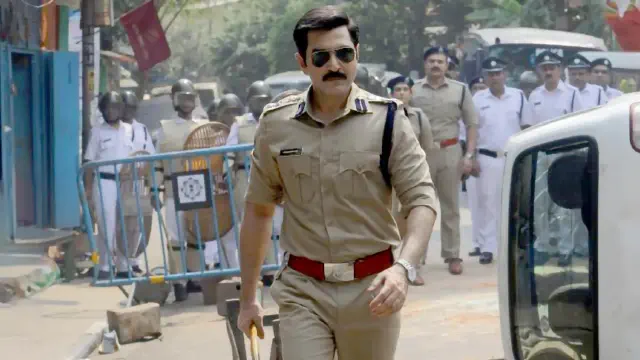
A Crime Drama That’s More Algorithm Than Rhythm
Creator Neeraj Pandey’s follow-up to ‘Khakee: The Bihar Chapter’ is mid-tier popular entertainment.
Like Khakee: The Bihar Chapter (2022), creator Neeraj Pandey’s standalone sequel Khakee: The Bengal Chapter represents the awkward second rung of crime thriller television — too trashy to be taken seriously, too serious to be pulpy, too long to be bingeable, and too predictable to be culturally specific. It’s more or less an old-school Prakash Jha potboiler stretched into long-form entertainment. A loaded ensemble and the illusion of a grassroots narrative are supposed to offset the generic tone, a cyclical plot and a repetitive landscape. This time, the focus is Kolkata in the early 2000s, where a no-nonsense IPS officer arrives to clean up a city ripe with bloody gang wars, sinister politicians and confused cops. A reporter exclaims: “Is the City of Joy now the City of Bhoy (fear)?”. Thankfully, the show explicitly mentions the timeframe at some point, because this is the one city that makes it hard to distinguish a period setting from a modern one. Timelessness is an aesthetic here; I assumed it was 2025 until I spotted a character holding a Nokia 6600 (which still made it look like 2022). Unfortunately, rumours of a Sourav Ganguly cameo in this seven-episode drama remain rumours, despite there being plenty of scope for a princely outsider with shirt-twirling charisma leading a team of gritty underdogs.
All 12 reviews of Khakee: The Bengal Chapter here
Be Happy

Abhishek Bachchan's Film is Dance Drama for Dummies
Remo D’Souza’s dad-daughter-dance triangle is a dull bubblegum movie.
If you watch Hindi cinema for a living (or a loving), chances are you will be cursed with the Red Flag Syndrome. What is this syndrome, you ask? (You didn’t ask, but I’m telling you anyway because clunky exposition is in my DNA). Being able to identify red flags in a film — or being able to see through a story within the first few scenes — used to be a superpower. But now it’s almost a crime, like X-ray vision for perverse superheroes: you’re accused of seeing the film naked. It took me all of 30 seconds to commit this crime with Be Happy.
All 8 reviews of Be Happy here
The Diplomat
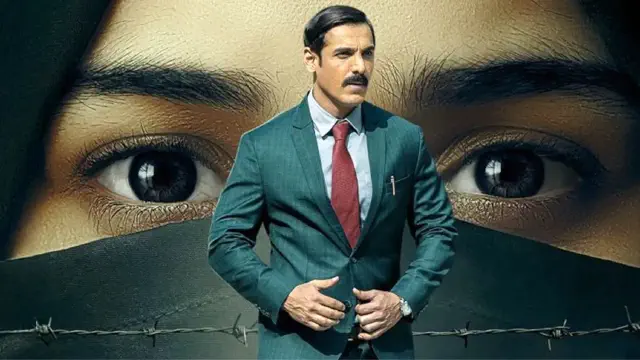
John Abraham Leads a Middling Political Thriller
Engaging in parts, but can’t resist a few unhealthy habits.
he Diplomat has all the elements of a solid thriller. The drama is Argo (2012) and Bridge of Spies (2015)-coded, where one government agent must negotiate the safe return of a citizen trapped in a seemingly hostile country. The premise is almost ready-made. The film is inspired by the true story of Uzma Ahmed (played by Sadia Khateeb), a woman who arrives at the Indian embassy in Islamabad desperately seeking refuge; she claims to have been tricked into marrying an abusive Pakistani man who kept her captive in the mountains. Deputy High Commissioner J.P. Singh (John Abraham) takes charge, determined to guide her through a maze of media scrutiny, red tape, court trials and political tensions. All he has are words and aura, in addition to the support of the Minister of External Affairs (based on the late Sushma Swaraj) from New Delhi.
All 12 reviews of The Diplomat here
Humans in the Loop

A Profound Take on Artificial Intelligence and Natural Order
Aranya Sahay’s beautifully conceived story won top honours at the 16th Bengaluru International Film Festival (BIFFes)
A great concept can be a curse. Take the one-liner of Humans in the Loop, for instance. An Adivasi single mother named Nehma (Sonal Madhushankar) starts working as a ‘data labeller,’ a job that requires her to train AI models to recognise the world in pictures and videos. This one-liner alone is so fertile — so ripe with cultural parables and documentary minimalism — that it’s hard to imagine a fictional film that expands on it. What can a feature-length story express that isn’t already implicit?
The Waking of a Nation

All Gunpowder, No Bullets
Ram Madhvani’s period drama lacks the technical finesse to explore the Jallianwala Bagh massacre.
In cricket, when the fielding team challenges an LBW (Leg Before Wicket) call, the DRS (Decision Review System) comes into play. This DRS process is a lot like reviewing a film or show. Every stage corresponds to real-world parameters. First, the third umpire checks if it’s a legal delivery — the equivalent of checking if the craft and shot-taking and basic staging are fundamentally sound. Then they move onto Snickometer to see if there’s an edge off the bat or glove — the equivalent of checking if the storytelling is engaging. Finally, Ball Tracking is used to project the trajectory of the delivery. Even here, it doesn’t matter if the ball is hitting the stumps, it has to pitch in line — the equivalent of checking if the intent and politics of the narrative add up. If all checks out, the on-field decision can be reversed and the batsman is ruled out — the equivalent of defying an anti-art industry and making a good show.
All 4 reviews of The Waking of a Nation here
Nadaaniyan
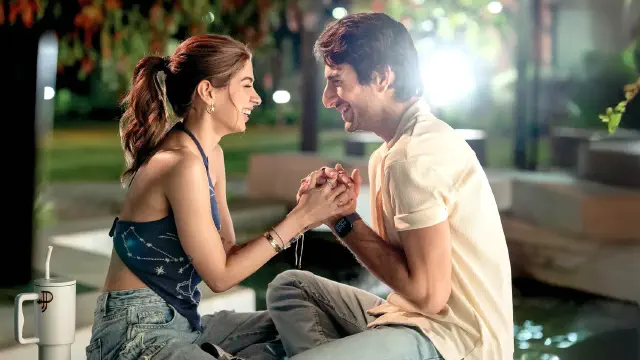
Ibrahim Ali Khan, Khushi Kapoor Both At-Sea in This Vacant Vanity Vehicle
‘Nadaaniyan’ blunts the Dharma Productions’ shtick of meta gags, woke updates and confessional storytelling
It’s a wonder that after 12 years of professional film criticism and finding creative ways to pan ghastly Bollywood movies, the deepest thought that entered my head after watching Nadaaniyan was: “I want to kick this film”. Such a primal, crude urge. Kick, really? So much for all those analytical skills and fancy words. All those carefully constructed rants and sarcastic takedowns. It’s the kind of thought that’s second to an animalistic grunt. I should do better. I should be calmer. But hey, at least I’m calling myself out here. At least I’m admitting that my brain is broken and incapable of making sense. That makes me ‘Self-Aware’. And self-awareness is a superpower that we often abuse to weaponise our flaws. In this day and age, an idiot that knows they’re an idiot is automatically wise.
All 19 reviews of Nadaaniyan here
Dupahiya
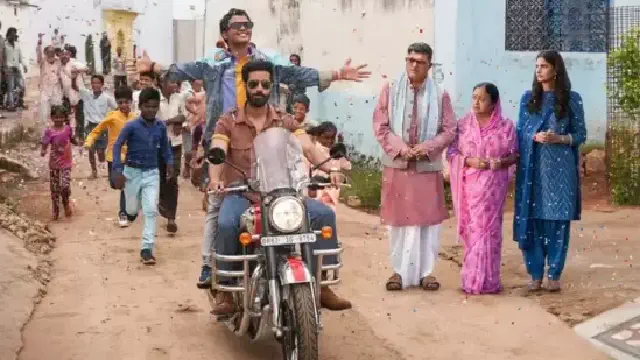
The Curious Case of a ‘Panchayat’ Hangover
The nine-episode series has its moments, but stays too derivative to make an impact.
I remember watching the first season of Panchayat (2020) and thinking: Wow, this is going to change things. And it did. It altered the way we perceived “comedy” as a serious genre. It was very exciting to see a simple, slice-of-life environment — the iconic fictional village of Phulera and its bittersweet characters — seared into the modern streaming lexicon. But I’d be lying if I said I was blindly optimistic. At the back of my mind, there was this fear — a fear derived from years of watching Hindi cinema overkill a new sensation. Nobody knows how to quit while they’re ahead.
All 4 reviews of Dupahiya here
Crazxy

Sohum Shah Leads a Crafty One-Character Thriller
The Girish Kohli-directed film is pulpy, attentive and nicely performed.
When a thriller opens with a long single-take shot, it’s a signal of intent. For a film called Crazxy — the spelling can be triggering until you realise it has something to do with an extra chromosome — this signal is very necessary. The shot starts on an ‘Ethical Dilemma of Surgery’ book, snakes across the posh apartment and follows its inhabitant, Abhimanyu Sood (Sohum Shah), as he leaves with a bag of cash to his garage. Jesper Kyd’s music is a hybrid of an Ennio Morricone spaghetti-western score and an ‘80s Bachchan potboiler. Within the next five minutes, we learn that this hassled man is a doctor, the amount of money is five crores, it’s April Fool’s Day, his angry boss is waiting at the hospital, and Abhimanyu has Haryanvi driving genes (he takes on a rowdy Gurgaon biker to return a middle finger). It’s clear that Crazxy means business. It’s also clear that Crazxy is better than its title.
All 8 reviews of Crazxy here
Superboys of Malegaon
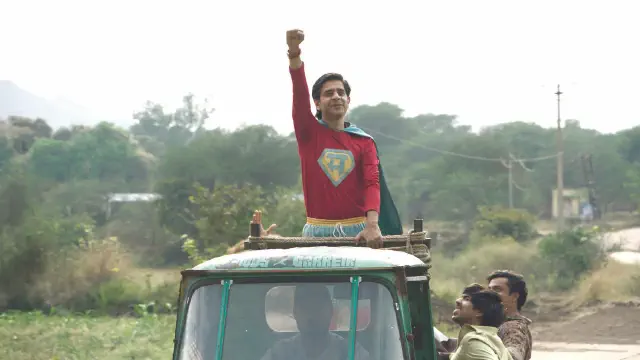
The Best Kind of Crowd-Pleaser
The Reema Kagti film is a captivating ode to cinema, living and everything in between.
Fictional translations of ready-made underdog journeys make me nervous. As do independent themes getting the mainstream treatment. A recent example is Taika Waititi’s Next Goal Wins (2023), a sports comedy about “the weakest football team in the world” that reduced its source material (a fantastic 2014 documentary) to a checklist of sef-conscious tropes. In terms of concept and design, Superboys of Malegaon ticks both boxes. Directed by Reema Kagti and written by Varun Grover, the 131-minute feature is inspired by Faiza Ahmad Khan’s Supermen of Malegaon (2012), a charming 65-minute documentary that revolves around the cinema-crazy residents of a small Maharashtrian town who start their own DIY-filmmaking ecosystem of Bollywood spoofs. I remember watching Khan’s documentary and marvelling at how it married the objectivity of journalism with the subjectivity of emotion. It allowed the story to tell itself, while trusting the ‘characters’ to underline its humour with cultural meaning.